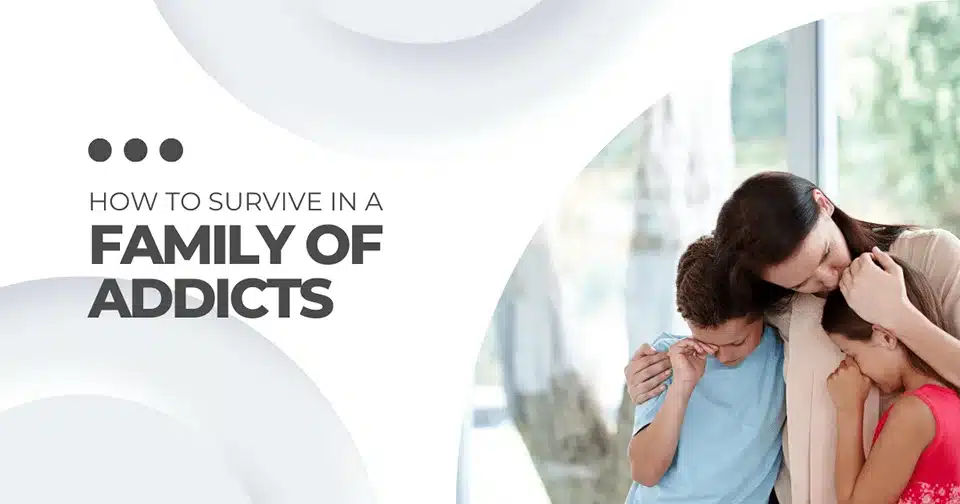In 2018, over 5.8% of adult Americans were dependent on alcohol or had problems related to alcohol use. More than 11.7 percent of individuals aged 12 and older reported taking an illegal substance in the previous month.
These figures reflect millions of individuals battling drug abuse and addiction, and virtually all of them have family and friends who are pulling for their recovery. Because families play such a vital part in the rehabilitation process, it is critical for spouses, siblings, parents, children, friends, and others to understand how they may assist.
If you’re a family member or friend of someone who is struggling with addiction, you may have a lot of questions and worries, including:
- How to handle addiction
- What can you do to help your loved one?
- Seeking out support groups for Families of Addicts.
Addiction may strike anybody, even in the most loving of societies. When a person develops an addiction, their family and friends are often affected. In addition to assisting your loved one in enrolling in a treatment program, it’s critical for family members and friends to have a thorough awareness of substance use disorder and how to maintain their health.
Curious about how to survive in a family of addicts? Keep reading to find out more!
Tips to Survive in a Family of Addicts
Surviving in a family of addicts is no joke and will require a fair bit of sacrifice on your part. With these tips, persons in a family of addicts can scale through the process successfully without any issues. Read on to learn more!
Researching Addiction
Families can move on from the blame game with the assistance of education. A person’s dependence on drugs or alcohol may not be caused by the individual’s inability to resist but rather by changes in the brain’s structure and function. Let go of hate and hatred against your loved one’s addiction by realizing that it is not something they choose.
Many internet resources are available to educate you about the dangers of substance abuse. The chemistry of addiction and the science of addiction recovery are likewise widely available in most bookshops.
In addition, researchers are always performing in-depth investigations into various medications. Research into how chemicals interact with brain cells is being used to create novel medicines that might cure or prevent addictions in the future.
That kind of information might give you a glimmer of hope. Your confidence in the ability of your addicted family members to overcome the addiction grows with each step forward.

Make Arrangements for Private Counseling Sessions
While lifestyle changes may benefit families in distress, addictions can leave lasting scars that need expert assistance. Families of addicts have been shown to have higher levels of despair and anxiety, according to research. Caregivers may be exhausted from everything they’re expected to do for their addicted loved ones, and they may lack access to healthy coping methods that may assist them.
Siblings or children may feel forgotten or as if they must do more to compensate for the addict, resulting in low self-esteem. Hence, the need for counseling for families of drug addicts.
Families affected by addiction should schedule a session with a family therapist for a secure space to discuss family dynamics honestly and work through concerns without fear of being judged or blamed. Caregivers learn more about coping with damaging attitudes and behaviors acquired through years of addictive behavior in private sessions, which often follow a skills-based framework addressed in a family program.
They may learn to meditate to cope with stress, or they could practice assertiveness. They might conduct group work on anger management or learn to let go of codependent tendencies so they aren’t held accountable for others’ bad decisions.
Manage Your Expectations
An addict’s treatment and recovery journey may be an exciting time for all those involved, including the addict and their family. Finally, the problem of drug and alcohol abuse is being dealt with. Things are finally going to improve.
Addiction-related habits and routines may take a long time to modify. Unfortunately, recovering addicts may go back into previous patterns of behavior or get disillusioned with their treatment. Disappointment may set in when things take so long to change.
It’s important to remember that relapsing does not equate to failure, either for your loved one or yourself. A relapse is a common part of the treatment process since addiction is a chronic condition. Recovery is not a one-time occurrence but a long-term process that includes ups and downs.
Keep in Touch With Your Happiness
When people are in charge of their happiness, managing expectations is a bit simpler. As a result, every member of a recuperating family must take a break to do something they like. Included in this are:
- Playing Musical Instruments
- Cooking
- Taking pictures of the natural world
- Gardening
- Assisting in the care of animals
- Having fun with kids
- Crafting
Participation in these and similar activities may help participants maintain a feeling of self-worth, foster a sense of accomplishment, and improve their mental health.
Exercise Regularly
While going for a morning run or evening swim may not be everyone’s idea of fun, these activities may offer major health benefits. Exercise may help relieve stress and melancholy. A 2014 Stress in America study found that almost half of people exercise to relieve stress.
Muscles and tendons stretch and press the brain, releasing dopamine and oxytocin. Stress and anxiety may be managed in a healthy way that doesn’t harm others or leave lifelong scars.
Instead of yelling, they may just leave. Instead of pacing, they may perform yoga. This strategy keeps you on track with your recovery and is easy to use.
Addiction Treatment in Orange County, CA
The road to recovery does not have to be lonely for families dealing with an addict. Numerous treatment clinics exist for both the addict and their loved ones, who benefit from the assistance they get.
Having the help of loved ones and friends might be crucial to a full recovery. To help your loved ones recover from substance abuse, reach out to the Opus Health team at 855-953-1345 to learn more about addiction treatment options available in Costa Mesa.




